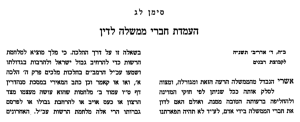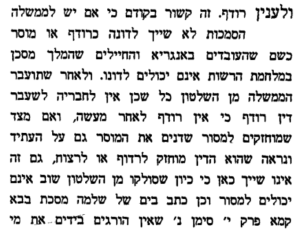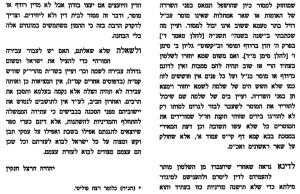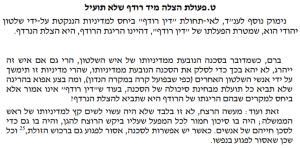Din & Daf: Conceptual Analysis of Halakha Through Case Study with Dr. Elana Stein Hain
This perek in Sanhedrin introduces the concepts of punishing preemptively – punishing the wayward son because of where his current path is leading him (נדון על שם סופו), punishing the home burglar because we presume readiness to commit murder (נדון על שם סופו), and various examples of people who are on their way to committing a capital crime and they may be stopped using lethal force (מצילין אותן בנפשן). These concepts, if expanded, can lead to an overreaching justice system, even one that punishes those who don’t deserve it. Additionally, especially the final concept of מצילין אותן בנפשן can easily lead to vigilante-ism and extreme violence in the name of religion. How have we dealt with these concepts in Jewish history? Do they still apply? If so, when? Are we worried about their slippery slope potential? Last week we discussed נדון על שם סופו, and this week we will discuss רודף, a prime exemplar of מצילין אותן בנפשן.
Sanhedrin 73a, 82a
Dr. Elana Stein Hain – dinanddaf@hadran.org.il
Listen here:
Watch here:
Sources:
- משנה סנהדרין ח:ו
וְאֵלּוּ הֵן שֶׁמַּצִּילִין אוֹתָן בְּנַפְשָׁן, הָרוֹדֵף אַחַר חֲבֵרוֹ לְהָרְגוֹ…
- משנת ארץ ישראל שם: Drs. Shmuel, Chana, and Ze’ev Safrai
ההנמקה איננה להגן על הזולת או על החברה, אלא למנוע ממנו לחטוא.
- שו”ת הרא”ש יז:א
ילמדנו רבינו מה לעשות באיש אשר נתפרסם עליו שהוא מלשין ליחידים מישראל ולקהל לאנסין והוא מגזם בכל יום תמיד שילך ויאמר לאנסין על אנשים יחידים וקהלות מישראל דברים שיוכל להגיע להם מחמתם נזק בגופם או בממונם והקהל מתייראין מהאיש הזה עד מאד שהוא נצב על משמרתו כל הלילות בחצר אחד מגדולי בעלי היכולת מישמעאלים
Question:
May our teacher instruct us on what to do with a man who has been publicly known as an informer against individuals and the Jewish community, reporting them to oppressors. He continuously threatens to go and inform the authorities about individuals and communities in a way that may cause them bodily or financial harm. The community is deeply fearful of this man, as he stands guard every night in the courtyard of a powerful Muslim nobleman.
והנה ניתן להם לישראל רשות מצד המלכות בסתר לדון אותו ואם ימצא מן הדין שחייב מיתה שימיתוהו ועל זה נתקבצו ראשי הקהל והעמידו בית דין לחקור הדבר אם יתאמת הפרסום הנזכר שיקבלו העדויות ועל פיהם ידונו מה שיראה להם מקו היושר
Now, the Jewish community has secretly received permission from the ruling authorities to judge him, and if he is found guilty of a capital offense, to execute him. Therefore, the leaders of the community have assembled and established a court to investigate the matter. If the allegations are verified, they will accept testimonies and rule in accordance with justice.
והנה יצאו לפניהם עדויות שזה נוסחם העידו ראובן ושמעון בפני בית דין שנתברר להם שהאיש הזה הוא מוחזק שהוא מלשין ומסור ושהוא גזם במלשינות שקר ליהודים פעמים רבות שמהיום חדש ועד הנה בהיות דון פוטרו בכאן באישבילייא כשהיה מגזם בכיוצא בזה גלגל עמו אחד מגדולי הקהל שיסור מזה הגיזום ושימנע ממנו ולא רצה להמנע
Testimonies have been presented as follows: Reuven and Shimon testified before the court that it has been confirmed that this man is known to be an informer and a habitual traitor. They further testified that he has falsely informed against Jews multiple times. From the beginning of the new month until now, when Don Pedro was present here in Seville, he (=the informer) made similar false accusations. When he did so, one of the prominent community leaders warned him to stop making such accusations, but he refused to desist.
והעידו עוד ראובן ושמעון הנזכרים שנתברר להם שהזקנים ואנשים רבים מהקהל יראים ממנו שלא ילשין הקהל לשקר וגם העידו עליו אנשים מלבד אלה שהוא מוחזק בחזקת מלשין ומסור ושגיזם לפניהם מלשינות פעמים רבות
Additionally, Reuven and Shimon testified that many elders and community members fear him, lest he falsely inform against them. Other individuals also testified that he has a reputation as an informer and has repeatedly made accusations in their presence.
עתה יורנו רבינו מה דינו אם יש לדונו כדין רודף כיון שהוא הולך ומגזם עתה בהיות דון פטרו בכאן ולא רצה לחזור בו מחמת מוכיחו ואם נתן להצילו בנפשו מההיא דרב כהנא בפרק הגוזל בתרא (קי”ז) .
May our teacher instruct us on his legal status—does he fall under the category of a rodef (pursuer), given that he continues to make threats in the presence of Don Pedro and refuses to desist when warned? And does the law allow us to save ourselves by taking his life, as derived from the case of Rav Kahana in Bava Kamma (117a)?
תשובה
גם כי בטלו ד’ מיתות בית דין מיום שגלו סנהדרין היינו דוקא שאין לדון את האדם לחייבו מיתה על א’ מהעבירות שחייבין עליהם מיתה דכיון שאין סנהדרין במקומם אין אדם שליט לדון את חברו למיתה אבל אלו דקא חשיב בסנהדרין בפרק סורר ומורה (ע”ג) שמצילין אותן בנפשן שאין נהרגין לשעבר אלא שלהבא להציל את הנרדף ממות או מפגעים אותם לא בטלו (במקום שהורשה לזה בית דין מצד המלכות כמבואר למעלה) דאין מיתתם תלויה בעדה ועדים אלא בראיית כל אדם שרואה אותם שנאמר לא תעמוד על דם רעך והרודף למסור ממון חבירו ביד אנס השוו חכמים לרודף אחרי גופו להרגו מהאי קרא בניך עולפו שכבו בראש כל חוצות כתוא מכמר מה התוא הזה כיון שנפל למכמר אין מרחמין עליו אף ממון של ישראל כיון שנפל ביד אנסין אין מרחמין עליו נוטלין היום מקצתו ולמחר כולו ולבסוף מוסרין אותו והורגין אותו אולי יודה שיש לו ממון יותר הילכך הוה ליה רודף וניתן להצילו בנפשו
Answer:
Although the four death penalties of the Jewish court were abolished when the Sanhedrin went into exile, this applies only to cases where an individual is sentenced to death for one of the transgressions punishable by capital punishment. Since the Sanhedrin is no longer in place, no one has the authority to sentence another person to death.
However, as mentioned in Sanhedrin (73a), there are cases where individuals may be killed preemptively (matzilin oto b’nafsho)—not for past transgressions but to prevent future harm. These cases remain applicable when sanctioned by the ruling government, as discussed earlier. Their execution does not require formal testimony and a legal tribunal but is instead based on immediate danger, as stated in Leviticus 19:16: “Do not stand idly by the blood of your fellow.”
The sages equated one who hands over a fellow Jew’s property to oppressive authorities with a rodef (pursuer), who is attempting to take a life. This is derived from the verse in Lamentations (2:11): “Your children have fainted, lying at the head of every street like a gazelle in a net.” Just as a gazelle caught in a trap is doomed, so too is Jewish property once it falls into the hands of oppressors. Initially, they seize a portion; later, they take everything, and eventually, they turn on the person himself, torturing and killing him to extract further wealth.
Thus, an informer (moser) is considered a rodef, and one may save himself by taking the informer’s life.
ובנידון זה שכתבת שהעידו עדים שבהיות דון פטרו שם שהיה מגזם להלשין ושדבר אליו א’ מגדולי הקהל שיסור מן הגיזום ושימנע ממנו ולא רצה לימנע היינו לגמרי עובדא דרב כהנא בפ’ הגוזל בתרא (קי”ז) דבעי לאחוויי אתיבנא דחבריה אתא לקמיה דרב אמר ליה לא תחוי אמר ליה מחוינא ומחוינא הוה יתיב רב כהנא קמיה קם שמטיה לקועיה הכא נמי כיון שאמר לו אחד מגדולי הקהל שימנע ואמר שלא רצה להמנע מיד התחייב בנפשו לכל ישראל
In this case, the witnesses testified that when Don Pedro was present, the informer made false accusations, and when a prominent Jewish leader warned him to stop, he refused. This is directly comparable to the case of Rav Kahana in Bava Kamma (117a), where someone intended to inform against another person, and Rav instructed that he be stopped by any means necessary. Rav Kahana preemptively struck him, just as the law permits in cases of rodef.
ואעפ”י דכתב ר”ח שאין הורגין אותן בידים אלא מורידין אותן לבור שלא יוכלו לעלות משם וימותו מעצמן מה שאמרו לגוי להרגו היינו כמו הורדה לבור דאינו עושה מעשה
Rabbi Chananel wrote that while it is forbidden to execute informers outright, they may be placed in a pit from which they cannot escape and left to die naturally. When the Jewish community instructs a non-Jew to execute an informer, this is considered equivalent to placing him in a pit, as no direct action is taken by Jews themselves.
וכן ראיתי בתשובה דמסור לשקר אף שלא בשעת מעשה מותר לשכור עליו עובדי אלילים לענשו
ויש מי שאוסר שלא בשעת מעשה לענשו ע”י עובדי אלילים וראייתן מדאמרינן בפ’ האיש מקדש (מ”ט) על מנת שאני צדיק אפילו הוא רשע גמור מקודשת שמא הרהר תשובה בלבו ומורי ה”ר יעקב בן ה”ר יצחק דחה זאת הראיה דילמא משום חומרא דאשת איש אמרינן הכי אבל לענין מסור מקילין ביה כיון דידעינן שהוא מסור לשקר ומחמרינן להציל נפשות אביונים נקיים מספק
I have also seen a ruling that one may hire non-Jews to punish a false informer, even outside the immediate moment of informing, though some disagree. The dissenters base their view on Kiddushin (49b), where a man who declares “on condition that I am righteous” is considered possibly righteous even if he is entirely wicked, since he may have repented in his heart. However, Rabbi Yaakov ben Yitzchak refuted this proof, arguing that such a leniency only applies in cases of marital law (ishut), which requires extra caution, but not in the case of an informer. Since we know he is a habitual informer, we must be stringent to protect the lives of innocent Jews.
תדע דאמר בגיטין בפ’ השולח (מ”ו) ההוא גברא דזבין נפשיה ללודאי אתא לקמיה דרבי אמי אמר ליה פירקן דהא תנן (גיטין מ”ו) המוכר את עצמו ואת בניו לגוים אין פודין אותו אבל פודין את הבנים משום קלקולא וכל שכן הכא דאיכא קטלא אמרי ליה רבנן לרבי אמי האי ישראל מוחלף הוא דקא חזו ליה דקא אכיל נבלות אמר להו אימא לתיאבון הוא דקא אכיל אמרו ליה והא זימנין דאיכא איסורא והיתירא קמיה ושביק היתירא ואכיל איסורא אמר ליה זיל לא שבקי לי דאפרקינך אלמא לא אמרינן דילמא עבד תשובה עד כאן וכל שכן בנידון זה (ס”א הילכך) שלפי העדות שהיה מגזם והתרו בו ולא רצה להמנע הרי זה בשעת מעשה ורשות ביד כל אדם לענשו ואין צריך לקבל עדות בפניו ואף שלא בשעת מעשה כשדנין עליו לענשו ביד עובד אלילים אין צריך לקבל עדות בפניו כי הדבר ידוע מי שהוא מוחזק מסור ומלשין העובדי אלילים מקרבין אותו בשביל הנאתן ואלו היה צריך לקבל העדות בפניו ולדרוש ולחקור בדינו לעולם לא יעשה ממנו דין כי ינצל ע”י עובדי אלילים כי אפי’ כשאינו בסכנה הוא מוסר יחידים ורבים כל שכן כשיראה עצמו בסכנת גופו שימסור בעלילות שקר ויסכן לכל ישראל.
A proof of this is found in Gittin (46a), where a man sold himself to bandits and later sought to be redeemed. Rabbi Ami refused, citing the Mishnah that forbids redeeming such a person unless his children are at risk. The sages argued that he was a mumar (heretic) since he ate non-kosher food even when permissible food was available, demonstrating no repentance.
לכך נהגו בכל תפוצת הגולה כשיש מסור מוחזק בכך ששלשה פעמים מסר ישראל או ממונם ביד אנסין שמבקשים עצה ותחבולה לבערו מן העולם משום מיגדר מילתא ושיוסרו האחרים ולא ירבו מוסרים בישראל וגם להציל כל ישראל הנרדפין מתחת ידו הילכך בנידון זה שהעידו העדים שהיה מוחזק מסור ומלשין וגם היה בשעת מעשה יפה עשו שדנוהו להענש לתלויה וכן יאבדו כל אויבי ה’ ואוהביו כצאת השמש וגו’ נאום הכותב אשר בן ה”ר יחיאל ז”ל.
In this case, since testimony has been presented that the man is a habitual informer and that he refused to desist when warned, the ruling is clear. It was proper to judge him and to have him executed, and may all the enemies of God perish in like manner. As it is written, “But those who love Him shall shine like the sun in its strength” (Judges 5:31).
Thus concludes the ruling of the writer, Asher ben Rabbi Yechiel (Rosh).
Showing that the din of rodef did not apply: R. Chaim Jachter citing Dr. Eliav Shochetman, Rav Eliyahu Henkin and R. Asher Weiss saying that it doesn’t: https://www.koltorah.org/halachah/the-halacha-of-rodef-and-the-rabin-shooting-by-rabbi-chaim-jachter-1
- רב הרצל הנקי ן, שו”ת בני בנים ג:לג March 1995



- ד”ר אליאב שוחטמן, שלטון יהודי אינו יכול להיות רודף, תחומין יט, תשנ”ט

There Must Be Clear and Present Danger
- שמואל א’ כד:יא
הִנֵּה֩ הַיּ֨וֹם הַזֶּ֜ה רָא֣וּ עֵינֶ֗יךָ אֵ֣ת אֲשֶׁר־נְתָנְךָ֩ ה’ הַיּ֤וֹם בְּיָדִי֙ בַּמְּעָרָ֔ה וְאָמַ֥ר לַהֲרׇגְךָ֖ וַתָּ֣חׇס עָלֶ֑יךָ וָאֹמַ֗ר לֹֽא־אֶשְׁלַ֤ח יָדִי֙ בַּאדֹנִ֔י כִּֽי־מְשִׁ֥יחַ ה’ הֽוּא׃
You can see for yourself now that the LORD delivered you into my hands in the cave today. And though I was urged-a to kill you, I showed you pity; for I said, ‘I will not raise a hand against my lord, since he is the LORD’s anointed.’
- פירוש רד”ק שם
ותחס עליך. נפשי או עיני ורז”ל פי’ צניעות שהיתה בך חסה עליך כי מותר היה להרגך כי רודף אתה והבא להרגך השכם להורגו:
- שוחטמן, המשך

47-8
- 9. Rav Aharon Lichtenstein, Sicha to Yeshivat Har Etzion on Monday, 20 Cheshvan 5756 (November 13, 1995).
(It has been translated and adapted by Rabbi Ezra Bick and Rabbi Ronnie Ziegler. Rav Lichtenstein had been in the United States during the week of the Prime Minister’s murder, and this day, nine days after the assassination, was his first opportunity to address the Yeshiva.)
Here was a man who grew up in the best of our institutions. A day before the murder, he could have been cited as a shining example of success and achievement, and a source of communal pride…Can we honestly say that what the murderer did was “despite” his education, in the same way that some yeshiva graduates are no longer Shabbat observers? In that case it is clear that the choice is “despite” the education. Is not here the choice, at least partly, not “despite” but “because?”
Full sicha here: https://etzion.org.il/en/philosophy/issues-jewish-thought/topical-issues-thought/nachpesa-deracheynu-venachkora
![]()
Hadran’s Beyond the Daf shiurim are also available by podcast on
Beyond the Daf is where you will discover enlightening shiurim led by remarkable women, delving deep into the intricacies of Talmudic teachings, and exploring relevant and thought-provoking topics that arise from the Daf.





